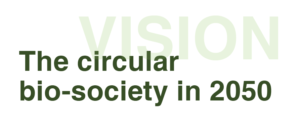 The Bio-based Industries Consortium (BIC) and fifteen industries unite to to set out their joint Vision for Europe’s bioeconomy future – a circular bio-society
The Bio-based Industries Consortium (BIC) and fifteen industries unite to to set out their joint Vision for Europe’s bioeconomy future – a circular bio-society
This Vision “The circular-bio society in 2050” will establish a sustainable and competitive bio-based industry in the EU enabling a circular bio-society by 2050. In this circular bio-society, informed citizens choose a sustainable way of life, supporting an economy that couples economic growth with societal well-being and respect for the environment.
The Vision focuses on four key drivers: Foster food security for a growing world population and meet its demand for sustainable products, contribute to a sustainable planet, create jobs and growth in the circular bioeconomy and achieve a circular bioeconomic society.
This Vision is the result of the collective input from by the Bio-based Industries Consortium (BIC) and its members, the Bio-based Industries Joint-Undertaking (BBI JU) advisory bodies: the States Representatives Group and Scientific Committee, and several organisations (amonst others, EUBP).
For further information, please visit This Vision website.
10 billion € to support the Circular Economy in Europe
Five European national promotional banks and institutions and the European Investment Bank (EIB) have launched the Joint Initiative on Circular Economy (JICE) to support the development and implementation of circular economy projects and programmes in the European Union (EU). This partnership will target at least 10 billion € of investments over the next five years (2019 – 2023). The aim is to prevent and eliminate waste, increase resource efficiency and foster innovation by promoting circularity in all sectors of the economy.
UK Government unveils new wave of R&D funding for the packaging sector
UK Government will invest 60 million £ in a new “plastic pollution challenge” designed to leverage a further 149 million £ of private investment in new sustainable plastic and alternative packaging technologies.
The funding – which forms part of the Industrial Strategy’s Clean Growth Challenge – is expected to support a wide range of initiatives, including projects to curb supply chain food waste, make plastic from plants, wood, or waste feedstocks, enhance materials’ recyclability, and develop new business models.
To support the new funding, the government has also published a call for evidence on standards for bio-based and biodegradable plastics.